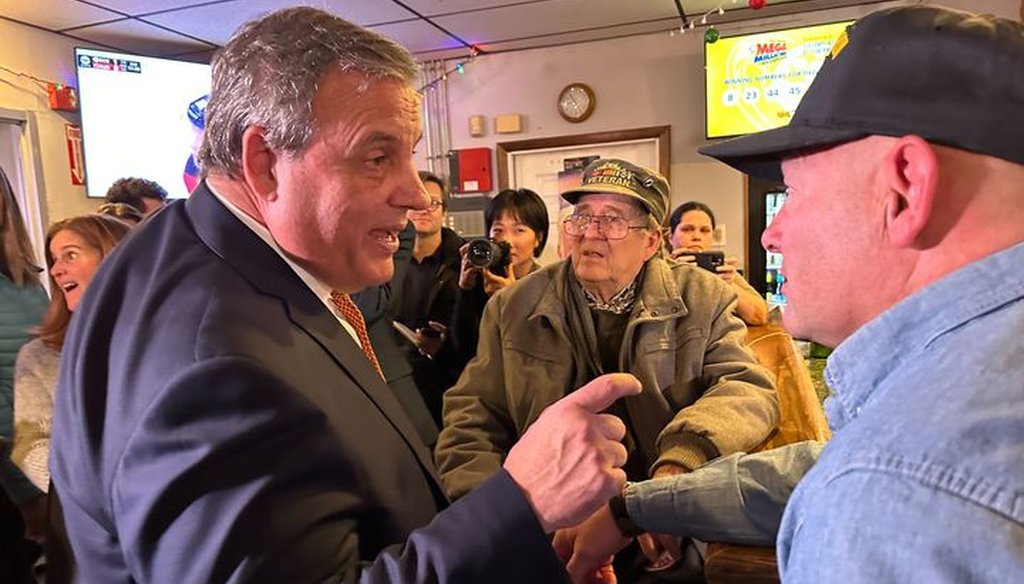

Our only agenda is to publish the truth so you can be an informed participant in democracy.
We need your help.


Republican presidential candidate and former New Jersey Gov. Chris Christie speaks to a voter after an town hall in Londonderry, New Hampshire, on Dec. 13, 2023 (Rebecca Catalanello/PolitiFact)
By conventional calculations, China met 83% of its commitment for agricultural purchases.
Christie offered an alternative calculation that doesn’t credit China for the level of purchases it was already making in 2017. This other calculation produces a result of about 40%, which is a bit higher than the one-third Christie cited.
Experts say that overall, China did not fulfill its commitments to buy U.S. goods and services, even though the rate was better for agricultural goods than it was for other categories.
LONDONDERRY, N.H. — Republican presidential candidates on the 2024 campaign trail are unwaveringly critical of China, and often of U.S. policy toward the economic giant.
At a town hall in Londonderry, New Hampshire, presidential candidate and former New Jersey Gov. Chris Christie directed the discussion of China toward agriculture and trade, taking a shot at one of his campaign rivals, former President Donald Trump.
Christie told the audience that Trump "said he made the greatest trade deals with China, right? You've heard him brag about his trade deals. Do you know, on the agricultural trade deals that he made, China's only fulfilled one-third of the promises of agricultural products that they were supposed to buy from our farmers? One-third."
We examined the data and found that Christie’s math conflicts with the standard way these numbers are calculated. But his approach is reasonable.
In January 2020, about a year before he left the White House, Trump signed what he called a "historical trade deal" with China.
Under the agreement, China pledged to purchase $200 billion of additional U.S. exports before Dec. 31, 2021. The agreement was widely regarded as unsuccessful, partly because of the coronavirus pandemic, which struck within weeks and prompted a worldwide recession.
It was "a terrible agreement," said Derek Scissors, a senior fellow at the conservative American Enterprise Institute.
Overall, calculations by the Peterson Institute for International Economics, a Washington, D.C.-based think tank, show China bought about 58% of what it had pledged in 2020 and 2021, the two years that were officially part of the agreement.
China bought 37% of its promised amount in energy, 54% in services, and 59% in manufacturing.
However, China fared the best in the one remaining major sector — the one Christie cited in his town hall. In agriculture, China met 83% of its goal, which is far higher than the one-third Christie said.
The White House Archives, "Remarks by President Trump at Signing of the U.S.-China Phase One Trade Agreement," Jan. 15, 2020
Peterson Institute for International Economics, "China bought none of the extra $200 billion of US exports in Trump's trade deal," July 19, 2022
Peterson Institute for International Economics, "US-China phase one tracker: China’s purchases of US goods," July 19, 2022
Politico, "Trump's gift to Biden: Record ag exports to China," Feb. 18, 2021
U.S. Department of Agriculture, "China: Highlights of 2022 Record Agricultural Trade with the PRC," Feb. 17, 2023
Email interview with aid Gary Clyde Hufbauer, nonresident senior fellow with the Peterson Institute for International Economics, Dec. 15, 2023
Email interview with Derek Scissors, senior fellow at the conservative American Enterprise Institute, Dec. 15, 2023
Email interview with Chad P. Bown, senior fellow with the Peterson Institute for International Economics, Dec. 18, 2023
Email interview with Karl Rickett, spokesperson for Chris Christie, Dec. 15, 2023
In a world of wild talk and fake news, help us stand up for the facts.
